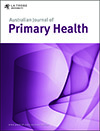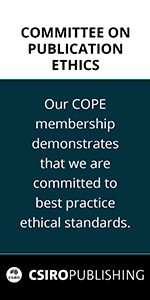Australian Journal of Primary Health
Volume 29
Number 6 2023
As the paramedic role continues to broaden into primary care suitable patient caseload, further focus is required on the paramedic-GP relationship. This scoping review discovered five key themes in this relationship – the importance of communication, scope of practice, leadership roles, responsibility for patient care and the significant of interdisciplinary training. Paramedic involvement with low-acuity care will likely continue, and an understanding of this key relationship will guide improvement strategies to enhance patient care.
Many acute infections improve spontaneously, and awareness of the natural history of such infections underpins community antibiotic stewardship clinical strategies. This study explored GPs’ awareness and views about using natural history information when consulting about self-limiting infections. We noted that GPs generally support using natural history information in consultations for self-limiting conditions, and do so variably and for various reasons. However, improved ready access to such information may facilitate its use.
There is a strong relationship between children’s health and their educational attainment. Poorer health, educational and social attainment are experienced by children and young people residing within the study area. Despite unique geographical contexts and demography, strategies that align strong leadership and effective management of change across three organisations were key and may make it possible to transfer a primary health care model designed to improve health and education outcomes for children and young people to other rural and remote communities.
Child health home visiting can improve infant outcomes but must be underpinned by evidence-based principles. There is little evidence on the content or efficacy of such programs in use in Queensland; a gap this study begins to address. Unevaluated programs may result in greater harm than benefit for families, and public funding may be spent on unproven models of care.
Young Australians are a priority population for sexually transmitted infection control, but experience barriers to discussing their sexual health with GPs. Our large, cross-sectional survey found that young Australians (aged 16–29 years) were generally receptive to discussing their sexual health. Our findings further highlight the important role that a school-based sex education and ongoing relationship with a GP can play in providing sexual health to young people.
Health professionals in various settings have the potential to engage in preventive health discussions and play a key role in early identification and management of children with obesity. This research extends our understanding of growth assessments and obesity interventions beyond general practice settings. This study has identified focal points for policy change, reporting requirements and implementation strategies that may improve the identification and management of children with overweight or obesity.
Access to preventative health care and screening is often challenging in regional areas. Free student-led pop-up health check clinics provide improved access and convenience, offering health education and early intervention strategies that aim to reduce future chronic health within the local population. This study demonstrates how community collaboration is able to provide screening services, support healthy behaviour change and strengthen the development of future health practitioners.
Assessment of SNAP lifestyle risk factors (smoking, nutrition, alcohol, physical activity) is fundamental to primary prevention of chronic disease. We used a cross-sectional population-based survey to examine the prevalence of SNAP assessments in South Australian general practice according to rurality. The overall prevalence was low (32%), but was higher in rural areas and among participants with existing cardiovascular disease or with multiple SNAP risk factors. Increased general practice SNAP assessments are warranted to match the level of risk across South Australia.
Intimate partner violence (IPV) is a global problem. With a small sample, this study determines family physicians’ attitudes towards IPV. Although IPV survivors attend primary healthcare services, there is a lack of knowledge and varying attitude among family physicians towards IPV. Family medicine speciality training and IPV training raise awareness about recognising, referring, and approaching IPV survivors. Female physicians have greater knowledge and a better approach to IPV survivors than males. Reducing gender inequality and education is critical in the prevention of IPV.
The 75+ health assessment has been identified as a suitable trigger to introduce advance care planning (ACP) to general practice patients. Our cross-sectional survey of 185 Australian GPs showed that (1) most patients interested in ACP were supported by general practices, and (2) the attitude that ACP is an essential component of the 75+ health assessment and regional/rural location were associated with GPs’ discussion of ACP during 75+ health assessments. More support and funding may be required to follow up on these important discussions.
People living with dementia and their carer(s) are not receiving optimal dementia care in the general practice setting. Primary care nurses working alongside general practitioners are well placed and keen to have a role in the provision of person-centred dementia care. This study is a significant first in the identification of published best-practice dementia care recommendations relevant to the role of the primary care nurse in general practice, providing guidance in the delivery of optimal dementia care to better meet the healthcare needs of people living with dementia and their carer(s).
The Otago Exercise Program is an effective falls prevention program that improves function; however, in-home and online physiotherapy-led, and home-based home care worker (HCW) supported delivery, has not been explored. Physiotherapist collaboration, formal HCW support and informal supports engagement were important for program acceptability, ongoing engagement, and optimising benefits. The By Your Side program was feasible and acceptable within home care services, and had many benefits for older adult and HCW participants including participation, confidence, emotional and functional improvements.
There is a need to increase the involvement of Australian general practitioners (GPs) working in private practice to realise the potential of direct-acting antiviral treatments for hepatitis C virus. GPs limit their scope of clinical practice, and when doing so, consider their confidence to competently provide quality health care to their patients and their professional interests. Although current support for GPs prescribing direct-acting antiviral treatments is well accepted, alternative care pathways are needed when GPs do not include direct-acting antiviral treatments in their scope of clinical practice.
With increased availability of online health information, individuals are more educated about managing their health care. Our study investigates patients requesting their own radiological scans rather than relying on their doctors’ expertise. We explore participant responses to clinical encounters where they have initiated a radiological study from their general practitioner, and their self-reported responses and outcomes from such requests.
Significant digital advances to hospital communication practices have occurred over the last 15 years, including technology-based methods to generate discharge summaries. An audit of discharge communication from a major tertiary hospital utilising a complete electronic prescribing/records platform showed there are large deficits in the quality and timing of information going to primary care after discharge. Incorrect use of electronic platforms can have major negative effects on the quality of discharge communication. Workflow processes must put a higher regard to correctly working in-line with the way these programs are designed.





